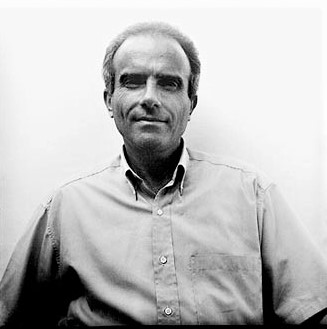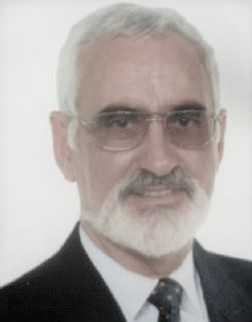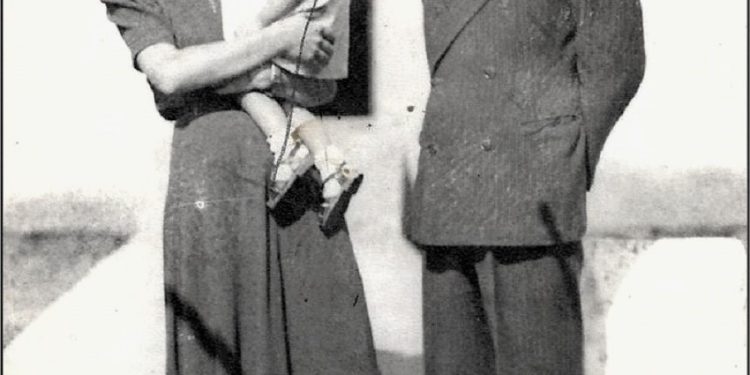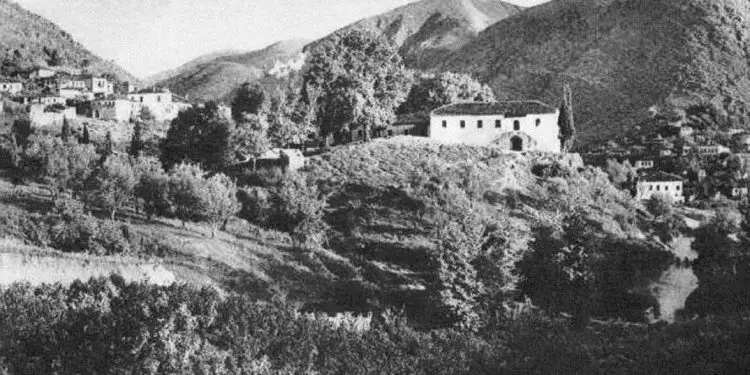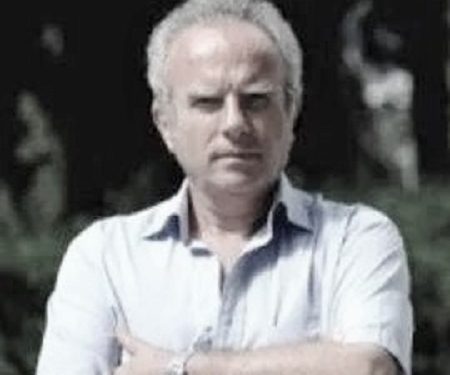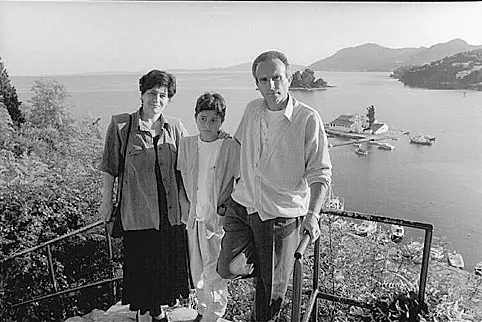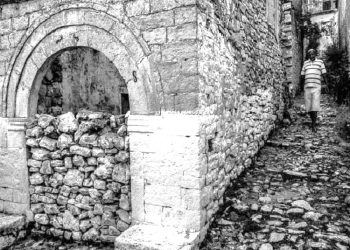From Thanas Gjika
The first part
– Portrait-biography, dedicated to Dino Thanas Martikos-
Memorie.al / During the national history of the Albanian people, many men and women have stood out for the courage with which they opposed the injustices and unjust orders of foreign or local rulers. This phenomenon has been widespread for centuries, but also during the years 1944-1991, when the communist dictatorship ruled. However, the terror policy and propaganda of the party-state forced the people to value servility towards the party and power as bravery. The courageous stances of those who opposed the Party’s policy, or the wrong actions of the Party cadres and the government, were punished with imprisonment, exile, shootings, etc.
The punishment also extended to his family members, who were also declared “enemies and traitors”. The deeds of these people were covered with silence and oblivion. Whoever showed them was also punished for agitation and propaganda against the state party. There were many intellectuals formed in the West, nationalists, ballisticians and legalists, whom the Albanian Communist Party fought and annihilated during the Anti-Fascist War and in the first years after the war. However, this same party destroyed many honest and brave communists who did not submit to its wrong policy.
Writer Robert Martiko, son of Dino Martiko!
After the one-party dictatorial system was replaced by the pluralist system, it was an intellectual duty to search for, appreciate and officially popularize those sons and daughters of our people who dared to oppose the party’s policy and who suffered the harsh punishments of that dictatorship. But the majority of the post-dictatorship political class consisted of ex-communists, ex-State Security officers and loyal servants of the Hoxha clan. Therefore, the search, evaluation and popularization of such brave men and women, was not posted as a second or third-rate task.
During the transition, former rulers, responsible cadres, writers, journalists and researchers from the time of the dictatorship, continued to be the main pens that filled the pages of the press and television channels. Exactly such people in power, belatedly created the Institute for the Study of Crimes and Consequences of Communism, to which they have created and continue to create numerous obstacles in its work. Even without shame, today’s socialist parliamentarians have demanded that this Institute be closed, in order to prevent the discovery of the crimes of the communist dictatorship and not to appreciate the deeds of the honest and courageous people of that time, who opposed the unjust actions of party cadres and party politics.
No time should be lost to seek, find and popularize the lives of such brave people in order to help the relevant institutions to appreciate this aspect of our lives. This work should not be left as a task that should be performed only by the former persecuted, because the majority of the people who continue to follow the left media, see them with crooked eyes and do not appreciate them, nor even read their writings. Therefore, it is the duty of all honest intellectuals, to try seriously, to recognize and appreciate with writings of different types, the deeds of these heroes, because their examples will inspire the Albanian youth, to create a moral society away from lies, without which our people cannot move forward…!
Following my writings, to discover and describe the lives and deeds of people who dared to oppose the policy of the Communist Party during and after the War, I am trying to build here a portrait-biography, for the worthy son of the Upper Bank, Himarjot Dino Themistokli Martiko, participant in the National-Liberation War, communist of 1942, who was twice sentenced to prison, in 1954 for 7 years and in 1979, for 23 years, when he was a 65-year-old pensioner. This brave man died prematurely in prison, after a year of torture in the interrogator and 6 years of torture. To collect the necessary data for the drafting of this article, I contacted Mr. Robert Martiko, Dino’s son, who helped me by answering many questions and then correcting and specifying many data in the first versions of writing.
Dino Martiko was born in 1914, in the village of Shënvasi in Saranda. He was the eldest of three sons in the family of Themistocles Mitro Martikus, which was a family in good economic condition. Mitro (Dhimitër) Martikua, in addition to the house and the fields, also practiced horse trading. He sent his son, Themistocles, at his own expense, to finish high school in Ioannina and then to Athens to pursue higher studies in economics. When the First Balkan War broke out, in October 1912, Themistocles, like many other Greek students and arborists (arvanitas), left school and volunteered to fight against the Turkish army, for the freedom of the Greek people, who were still under the Turkish yoke. He took part in the battles of Thessaly, where from the beginning he stood out for his courage and bravery on the battlefields. The Greek military command, following the results of the fighting, gave him the rank of lieutenant.
When he came to Delvina, to the town square, people lifted him up in their hands, throwing him up with cheers. His father, Mitro Martikua, who was known for his courage and intelligence in Delvina and in the surrounding area, when he saw the waiting that was being done for his son, said to some friends who were by his side: “If I die now, I will to be the happiest man in the world”! Martikova’s family had many friendships with Christian and Muslim families. Trade required, as it does today, extensive and numerous relationships. In the summer of 1913, Themistocles decided to stay close to the family to help his father. Instead of going to Athens to continue his studies, he got married and after a year became a father with a son, whom he named Dino (the short form of the name Kostandin). But a few months later, his father was treacherously killed in the well. It is said that Mitro’s horse did not want to go that day, but the master’s whip forced him to go forward.
It was not found out who the killer was…! A few days before the murder, there had been a scene in Shënvasi, with some fellow villagers, who had committed theft in a Muslim village. Mitrua cursed them with harsh words: “Treacherous, masquerades, you shamed our village.” In his presence, they didn’t utter half a word, but after a few weeks, Mitrua was found murdered in the well. His burial was held with honors, within the territory of Saint Basil’s Monastery. Since the murderer was not heard, Themistocles said to his mother: “Let us thank God, who gave us Dino, as a substitute for our father.”
After the formation of the independent Albanian state, the small port of Saranda was getting lively, Themistoklius felt that trade there would quickly bring good profits, so he went and rented a shop in that town. He left his family in the village, and during the first year, he arranged a place to sleep in an alcove of the shop. Then he bought a house nearby. Dinua, a baby of a few months, had not felt pain for the tragic death of his grandfather, while the death of his father, when he was 6 years old, broke his heart. The shock of that day, with the women’s cries and memories, would remind him every time he would be in difficult moments. Like most orphans, he grew up with spiritual trauma. But despite all the shock and pain, this child, from a very young age, showed signs that he would become a smart and energetic person.
Dinua, was educated in Albanian, Greek and Italian
When Dinon was still six years old, before his father died, he would take him to Saranda on Mondays and return him on Saturdays. In Saranda, he enrolled him as a student in a school, where he began to learn the alphabet and some mathematical operations. In the village of Shënvasi, there was no school and the child felt that he could remain uneducated. One day he burst out, addressing his grandmother as an adult: “Either find me a school, or this factory where you work all day, I will tear it to pieces.”
He said these words to his grandmother, who loved him more than his mother. For her, he felt love and compassion, but the concern that he would remain uneducated revolted him, so he called out to his grandmother with a broken heart. She did not get angry, she raised her eyes to the sky, sighing: “Help, O God, the light of our eyes not to remain without school”! And, as if God had heard her prayer, in the summer-autumn of 1921, the first elementary school was opened in Shënvasi, where Dinua was also enrolled. After completing the three years of this school, his uncle, Qirjako Vjero, was interested in his further education with the family friend, Jaho Kalasa, who lived in Delvina. This managed to secure from the government of Tirana, a scholarship for the orphan boy, to continue his studies at the Greek school of Voshtina, a small village in Greece, near the border.
In Voshtina, 10-year-old Dinon was pierced by his uncle, who was involved in horse trading between the two countries and knew the director of that school. He promised that he would take care of the boy’s well-being. He assigned a special program to Dino, to learn the Greek language in a short time, so that he could walk parallel to the other students. Dinua showed his skills and was able to grasp the curriculum, just like his fellow students.
Resourceful by nature and unsophisticated, he successfully coped with the harsh regime of dormitory life. They got up every day at 5 o’clock in the morning to do aerobics in the rain and snow. It was very cold in Voshtina. In January the roads were blocked by snow and opened at the end of March.
Good results in lessons and his correct attitude evoked respect and sympathy from fellow students and teachers, with the exception of the teacher who taught music and handicrafts. One day when all the students were singing, she saw that Dinua was not singing and asked her:
“Why don’t you sing”?!
Dinua replied that he had no ears for music, that’s why he didn’t know how to sing. She insisted and asked him to sing any song he knew. And Dinua began to sing the Flag Anthem. The teacher was satisfied and wanted to tell her how you learned this Albanian song, learn Greek songs too. However, a fellow student who was from Gjinokastra, told the teacher that that song was the anthem of Albania. Then the teacher gave Dino a hard palm on the cheek. With a lightning move, he kicked the teacher in the stomach.
She was surprised, but did not react further, by striking at him. He punished him not to go out to play in the school yard during the big break. When the students came out, Dinua waited a few minutes and then turned the stove device to a horizontal position on the fire and prevented the smoke from escaping. The classroom filled with smoke. The first student who came from recess, notified the same teacher, but he did not come by himself, informed the school director. When he entered the classroom, he noticed Dino rubbing his teary eyes and instead of punishing him, he burst out laughing, saying: “Ah, your stupid head”!
The director did not want to punish his friend’s nephew, opened the windows and left…! After finishing this school, Dinua returned home satisfied that, in addition to the curriculum, he had also learned the Greek language. The Mayor of Delvina, Asim Kalasa, the son of Jaho, a family friend, helped Dino to go to Vlora to continue his studies, at the Commercial School, an Italian economic school. During his studies at this school, the boy qualified as an accountant and mastered Italian very well. As soon as he finished this school, he was appointed secretary in the Municipality of Delvina, where he worked until April 6, 1939. The fascist invasion of Albania also brought Dino’s dismissal from his job.
I don’t care about the consequences; I care about the burial of the corpse!
In 1937, the Delvina Uprising broke out, against King Ahmet Zogu I. This revolt was organized by the brothers Et’hem and Ismet Totua, with their anti-zog sympathizers. However, the royal forces suppressed the uprising and caused many casualties, and 400 participants were arrested. Among the victims of that uprising was Lieutenant Xhevdet Gjoleka, the grandson of the unforgettable Zenel Gjoleka. Xhevdet was killed in his sleep by a friend of his, paid by Ahmet Zogut. The king gave an order that the corpse of lieutenant Gjoleka should not be buried, but left at the Çerçiz square in Gjinokastra, until it rots.
23-year-old Dinua, as soon as he heard this news, knowing that Xhevdetin’s three sons were small and no one would listen to them if they were looking for the corpse, he left for Gjinokastër himself, where he met the prefect. After clarifying that the murdered man was the son-in-law of Jaho Kalasa, to whom Dinua owed his education at the Trade School, he asked for permission to take and bury the corpse. The prefect, as the King’s servant, did not dare and answered:
“Boy, don’t get yourself into enmity with Nalt Madhnia! You will have serious consequences.” Dinua, without batting an eye, calmly replied: “I’m not interested in the consequences, I’m interested in burying the corpse.” You have no law to violate the popular custom of burying a corpse.” The prefect felt distressed, but gave the order to hand over the body of the murdered man, which Dinua took care of and buried at the Gjinokastra cemetery.
When I heard this event from Robert, I was impressed by the behavior of this prefect, who dared and broke the King’s order, under the pressure of a persistent citizen, who told him that he should not violate popular customs and traditions, as long as he did not have a written law. However, during the years of the communist dictatorship, none of the high party and government cadres, together with those of the State Security, dared to break Enver Hoxha’s orders to imprison, deport and shoot people, even though these orders were often not supported. in no court decision, or written law! Unfortunately for us during the transition years, crimes of a different kind are taking place. Now there are written laws, but they are broken by corrupt judges and officials.
Do not trust spies, they are mean people, who are sold for money!
After April 7, 1939, until October 1940, Delvina also experienced the Italian occupation, which was interrupted after the failure of Fascist Italy in the Italo-Greek War. This city, like many cities and villages of South Albania, was liberated from the Italian army. However, this liberation was not a real liberation, because the Greek army, which drove out the Italian army, very soon began to behave like an invading army, announcing sometimes openly and sometimes quietly, that the lands liberated by the Italian invaders were Greek lands and they belonged to Greece. Dinua did not want to believe her eyes, when she was listening to some Albanians, Christians and Muslims, who were shouting in Delvina square: “Zito Elladha”! (Long live Greece). The funny scenes that were organized in Durrës, Tirana, Vlorë and Sarandë were being repeated, where some paid Albanians shouted in the first days of the Italian occupation: “Viva Italia, Viva Duce!” (Long live Italy, long live Ducja).
Dinua, even though Delvina was filled with Greek soldiers, started cursing the cheerleaders left and right and the merchants who were changing shop signs written in Albanian with signs written in Greek. Not even half an hour passed after his screams, when a patrol with three Greek soldiers, from the Greek Security Service (Asfalias), was given there. Next to Dino was a Muslim Albanian, known to him. The patrol commander asked: “What is your name?” “They call me Apostle, or Toli,” answered the Muslim Albanian, who was next to Dino, in a hurry. Dinua chuckled. The commander addressed Dino: “What about you, what’s your name?” “Dino, Dino Martiko”, he answered. But the Greeks used and use only the full form Kostandin and the commander thought that he was some Albanian who came from Chameria where he had heard this name. The commander ordered without further ado: “We order you to come with us to the command” and gestured with his hand to the soldiers to put Dino in the middle and escort him to the command offices.
The tall soldier before whom Dino was pierced had a ferocious look, accentuated by his eyes set in two large sockets. This was the famous Major Petropoulos, the Chief of Security of the Greek Army, in the areas; Through-Ginokastra Sarandë. A few weeks later, this same major, to instill terror in the people, dragged him tied to his tricycle with a rope until he died, a Himarjot who was accused of being an agent of the Italians. Between the major and Dino, the conversation began: “What are you?” “No, I am Orthodox Albanian”. “Where there are Orthodox Albanians, take mascara! Orthodox are Greek, Albanians are Turks. Do you know that I hang you at Delvina’s maple tree”?! “There is no greater honor for me than to hang me on Delvina’s maple tree”! – Dinua answered him and continued: “But before that, you should know that all the spies of Ahmet Zogu became spies for the Italians and today they came and became your spies.”
The major stood up. He raised a short whip to strike the detainee in the face, but Dinua, with his strong hands, seized the hand that held the whip and was keeping him trapped. At this moment, the door opened and a Delvinjot priest who knew Dino entered, who immediately addressed the soldier: “Mr. Petropulos, you are wrong. This guy should not be arrested, he made propaganda in favor of Greece, before you came to Delvina”. It was true. Dinua, in the last days of October 1940, when the Italo-Greek war just broke out, began to listen to the news broadcast by Athens radio and reproduced the words that were said by it, that the Greek army would liberate Albania from Italian fascism, until it was thrown into Adriatic. Due to the lack of political experience and considering the fact that his father had fought for the freedom of the Greek people in Thessaly, Dinua thought that the neighboring peoples find each other in times of need. But when he saw how the Greek soldiers behaved and what they said, after they came to Delvina and Saranda, he sobered up and openly opposed the chauvinist propaganda and the calls of the spies…!
Thanks to the intervention of the priest, Major Petropulos released the arrested. Dinua, had his aunt married in the Bamiha family in Delvina. She was a dynamic woman, when she heard that her grandson had been arrested, she pushed the priest to intervene with Commander Petropulos. But even after escaping punishment, Dinua did not stop speaking out against the chauvinistic behavior of the Greek army. Meanwhile, Petropullos had left with part of the army, towards the coast of Himara. Dino was arrested again and there was a total of six people in prison, five Muslims and only one Christian. Among the prisoners was the priest Asim Zejno, an acquaintance of his with whom he would become friends even more in Vlora, where they would live close to each other.
His aunt, who had sent the priest the first time, now made another attempt to get her nephew out of prison, and succeeded. At the end of the first week of isolation, the head of the prison, a Greek officer, went to his cell and opened the door and shouted: “Dino Martiko come out, you are free”! The officer was surprised because Dinua, instead of leaving as soon as possible, answered: “I refuse to leave the prison.” After a few minutes, another officer came and asked: “How is the work?” Dinua repeated: “I don’t agree to get out of prison.” At that time, the officer asked him for clarification, and Dinua continued: “Why do you keep these honest people that all of Delvina knows as prisoners, while the dirtiest people, the spies, you keep as friends in your bosom. Until yesterday they served the Bird, then the Italians and now they serve you. Without releasing these innocents, I will not go out.”
The officer left, but when he came the next day, he had with him the decision to release the four prisoners. They kept only two, which they considered violators of the law. Asim Zejnua was also released. In the years 1960-1978, when they drank coffee together in Vlora, Asimi mentioned Dino’s noble gesture in the presence of many men, even though he knew that Dinua had suffered his first prison sentence in the years 1954-1957. Memorie.al
The next issue follows




